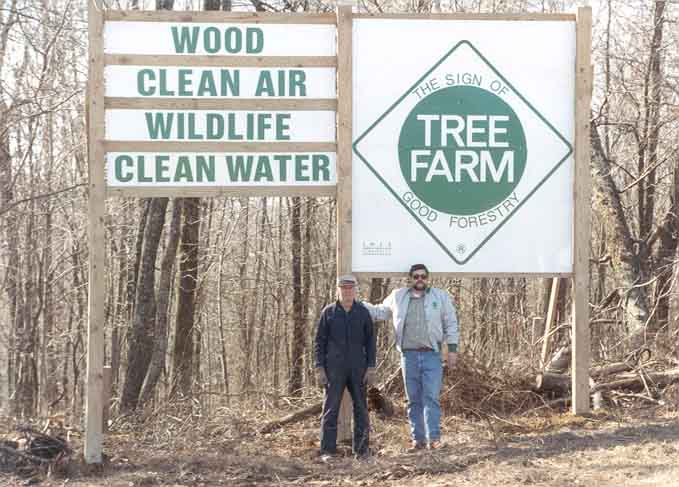
Spring 2000 Volume 9, Number 1
GREEN CERTIFICATION
TRENDY FAD OR FUTURE OF FORESTRY?
by Julie Ramey Indiana Hardwood Lumberman's Association
Green Certification has become the buzz term of the new millennium for the forest products industry. Some roll their eyes in disgust after all, it's just another "environmentalist" fad. Some wring their hands with anxiety; how is this going to affect on-the-ground management of forests? Some sign and say, "Let it come. We're doing a good job with sustainable forestry." A lack of cohesive effort, and the absence of agreement on green certification standards, has prevented the nationwide adoption of any single certification program. Inevitably, though, green certification is coming, and with it major impacts on the hardwood lumber industry in Indiana.
A green certification meeting held February 2 at the Hyatt in Indianapolis before the official start of the 2000 IHLA Convention was one of the best-attended sessions of the entire convention. Representatives of state and federal government, consulting foresters, universities, sawmill owners, land managers, landowners and loggers attended to hear the points of view of three organizations that manage their own widely varying green certification programs.
Currently, 58.5 million acres of forestland in the U.S. are certified by the
Sustainable Forestry Initiative through the American Forest & Paper Association.
According to Jay Farrell from AF&PA, certification standards are very defined and
rigid. AF&PA members whose land is certified under SFI can opt to have third party
verification of certification, but it's not required. The cost for SFI certification is
included with AF&PA membership, but Farrell indicated actual cost for members is a
minimum of $500 annually.
"SFI is a reaction to social pressures, and the need to assure legislators and customers what we're doing on the ground is good," Farrell said. "However, certification doesn't necessarily improve on-the-ground forest management." Farrell added that SFI focused on making on-the-ground management improvements, but the effectiveness of those improvements is not clear.
A criticism of the SFI program is the lack of a chain-of-custody requirement. The question of how to certify wood that comes from a variety of landowners has not yet been addressed. Farrell added, "A lot of wood comes from private land. We can't control it."
Hoping to join the efforts of SFI by the end of 2000 is the American Tree Farm program, operated by the National Forest Foundation. Twenty-five million private landowners operate 83 million acres of Tree Farms across the United States; of these, 65,000 are Certified Tree Farms. Sue Shaddeau of the NFF said volunteer foresters are responsible for the certification of Tree Farms. Only about 800 foresters are available to inspect the above acreage. According to Shaddeau, certification helps Tree Farmers move rapidly toward better forest management programs.
The Tree Farm program does not charge landowners for certification. "We have never charged for certification, and we will not charge," Shaddeau said. "Good forest management costs money, and not all landowners are wealthy land barons like they've been portrayed in the media."
Tree Farm is seeking recognition from other certifying entities, including SFI and Pan-European group, by the end of the year 2000.
The nation's oldest certification program, the Forest Stewardship Council's Smartwood, has provided forest certification services since 1984. Smartwood's goals are to promote responsible on-the-ground forestry practices, and to allow consumer choice to influence forest management. Dave Bubser from the FSC said that unlike other certification programs, Smartwood is performance based, and on-the-ground management performance provides the basis for certification. There are several types of certification in this program: forest management, wood products moving through the chain of custody, group certification for non-industrial private forest groups, "rediscovered" wood, and non-timber forest products such as ginseng and qum. Each certification program involves intensive study of what's actually going on out in the woods, and includes a look at the company itself. Management policies and plans, and the company's relationship with its' employees and the community are all included as part of Smartwood certification.
Bubser said Home Depot, a U.S. chain of lumber and building supply material stores, declared certification in August 1999. They plan to carry only FSC Smartwood certified materials from their suppliers beginning in 2003.
Questions raised in Indiana about green certification are many and varied. For the most part, suppliers do not promote green certified wood; most promotion for green certified products comes from certified companies. The host of the PBS television show "New Yankee Workshop" indicates during his program the wood he uses for his projects comes from green certified forests. However, Bubser said studies indicate that of all the FSC Smartwood certified wood harvested, only 13 percent makes its way into certified markets.
Environmental groups in the 1980s said, "Don't buy tropical timber; buy temperate and boreal timber." Their current message can now be summarized as "Buy certified timber to have a 'clear conscience' and to make sure you do not contribute to the destruction of the world's forests." However, studies show there is little or no willingness on the part of the consumer to pay more for green certified products.
IHLA, as the voice of Indiana's hardwood lumber industry, is looking at ways to economically, efficiently and appropriately bring green certification to the state. A lack of cohesive effort makes the project difficult, and there are many questions to be answered, including cost of certification and the rea'lity 'of good markets for green certified products. Green certification efforts can be far-reaching, and can not only increase the acres of sustainably managed forests, but can also tell the public through action that members of the hardwood lumber industry are the true environmentalists.
Bubser said, "Smartwood, Green Certification, is not a trend, not a fad, not a scheme. In the truest sense, it's a responsible approach to satisfying the public's insatiable demand for wood."